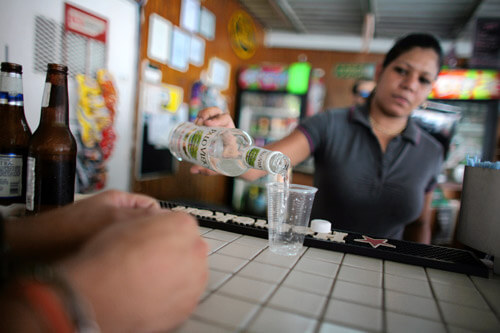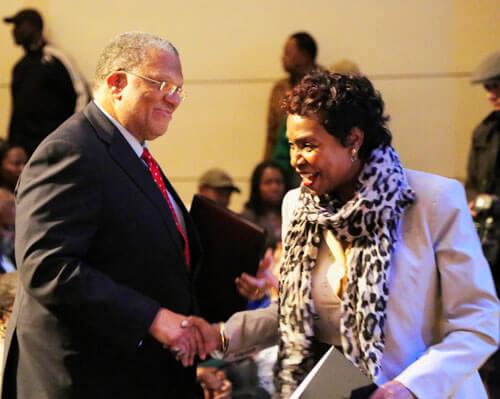Caribbean Community (CARICOM) leaders on Tuesday night said they have conducted a “very successful” two-day inter-sessional summit at Buccament Bay Resort in St. Vincent and the Grenadines.
St. Vincent and the Grenadines Prime Minister Dr. Ralph Gonsalves, who is also CARICOM chairman, said leaders completed a 20-odd agenda and implementing policies and strategies that would ensure the future socio-economic and political development of the region.
Gonsalves told reporters that the summit dealt with several matters regarding the further development of the 15-member regional integration grouping, ranging from information communications and technology (ICT) to a future trade agreement with Canada.
“We had a very successful conference, we had 20-odd items on the agenda, and we completed the agenda,” he said.
The CARICOM chairman said that the ICT sector was high on the agenda, with leaders agreeing that it “should take place in tandem with the reform process of the region for the years 2014-19.”
The meeting received a presentation by Grenada’s Prime Minister Dr. Keith Mitchell, who has lead responsibility for ICT within the quasi-CARICOM Cabinet.
Gonsalves said leaders agreed that there should be sustained effort over the next two years for building a single ICT space in the region.
He said a road map would be presented to the leaders when they meet for their regular summit in Antigua and Barbuda.
The Vincentian leader said ICT development comes at a time when the region is developing its human resource potential.
The leaders also welcomed a presentation by St. Kitts-Nevis Prime Minister Dr. Denzil Douglas, who is celebrating his 25th year as a legislator in the twin-island federation.
In his summit presentation, Mitchell said very few CARICOM countries “can truly report” that the investment made in ICT so far has produced the corresponding benefits that have been promised.
He said there were “intrinsic barriers to ICT infusion and adoption in countries referred to as Small Island Developing States (SIDS).
“This is timely, since this year we observe International Year of SIDS culminating in the Summit in September in Samoa,” the Grenada prime minister said.
“It would be terribly remiss if we do not amplify the ICT barriers as having equal, if not more urgency, than the environmental, economic and social vulnerabilities already identified and articulated for discussion,” he said.
Mitchell said some of the barriers include difficulty in achieving economies of scale in all endeavors of economic and social development, in particular with respect to cost of infrastructure, human resource, skills and competencies, as well as high costs of broadband connectivity and lack of funding for capital investment to fund ICT infrastructure.
On the issue of reparations for slavery and native genocide, Gonsalves said CARICOM leaders are hoping to hold talks with Europe in June.
“I would say that we made good progress on that issue, and, before the end of June, some approach is going to be made to the European countries in relation to this matter of reparations,” he said, adding that regional leaders continued to discuss the issue before the summit’s end, focusing on a budget for the regional commission on reparations for African slavery and native genocide.
CARICOM leaders also adopted a 10-point reparatory justice framework, presented by Prof. Sir Hillary Beckles, head of CARICOM’s Reparations Commission.
Gonsalves said the framework comprises “basically issues relating to things which have been talked about all the time like an apology, the question of organizing with African countries and those persons who want to have reparations, matters relating to health, education and literacy, building the cultural institutions and matters concerning a special program for the development of the indigenous people.”
Gonsalves also said that CARICOM leaders made “more than baby steps” on the issue of the decriminalization of marijuana for medicinal purposes.
“On my side, we haven’t seen a significant contribution of this plant,” he said adding that given what is taking place globally, and particularly in the United States, where 20 states have decriminalized marijuana for medical purposes, he will like to see CARICOM move in that direction.
“Certainly, there is a case to be made to liberalize the existing harsh laws, particularly for small quantities for personal or religious uses,” he said, noting that there are possibilities in the discourse that is taking places, but there are challenges, which remain.
He said the federal government in the United States, “which cannot be taken for granted,” still holds the line in accordance with the United Nation’s convention on psychotropic substances — that they should not be legalized.
CARICOM leaders also expressed concerned over the failure of Guyana to approve the Anti-Money Laundering and Countering the Financing of Terrorism Act (AML/CFT).
Guyana’s President Donald Ramotar told reporters that the issue was raised during the summit and that his colleagues “are extremely concerned about what is taking place in Guyana.
“While it is Guyana directly it has the implications of affecting the region as well, so CARICOM leaders are very worried about it,” he said.
Last November, the Caribbean Financial Action Task Force (CFATF) announced that it had blacklisted Guyana after the CARICOM member-country failed to approve legislation to combat money laundering and countering the financing of terrorism.
The Organization of American States (OAS) has said it was prepared to offer help Guyana ensure that it enacts legislation dealing with anti-money laundering and terrorism.
Last month, the Guyana government launched a series of town hall meetings aimed at pressuring the opposition into supporting the measure.


























